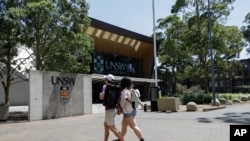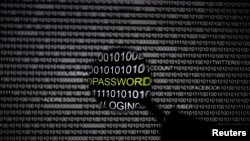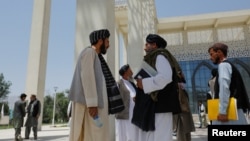Student Union
College Campuses Weigh Free Speech vs. Anti-Semitism

A recent presidential executive order declaring Judaism a nationality has further divided campus groups that either support or denounce Israel's occupation of the West Bank.
While the Trump administration says its Dec. 11 order targets anti-Semitism on campus, critics say it threatens free speech and the right to protest against the Israeli government. Anti-Semitism is hostility to or prejudice against Jews.
"If the government thinks it can sanction educational institutions for permitting students to say things like, 'I oppose Israel's West Bank settlements,' or 'Israel's treatment of Arabs is racist,' and say that the students who say those things are discriminating against Jews as a race, color, or national origin group, well, then the government is nuts," said Don Herzog, First Amendment expert and professor at the University of Michigan, Ann Arbor School of Law.
Herzog was referencing student and campus movements that oppose Israeli occupation of Palestinian territories and Israeli settlements, such as Students for Justice in Palestine (SJP) and Boycott, Divest, Sanction (BDS). SJP started at the University of California-Berkeley in 1993, and has more than 80 chapters in the U.S. and Canada. BDS was started on the West Bank in 2007 and has spread to college campuses in the U.S. and worldwide.
Those who support the executive order lauded U.S. President Donald Trump.
"We appreciate @realDonaldTrump's decision to give the @usedgov the authority to counter discrimination against Jewish students," the American Israel Public Affairs Committee (AIPAC), a pro-Israel lobbying group in the U.S., said in a Dec. 11 tweet.
The order will "recognize the importance of the problem" and gives "the Jewish people and the land of Israel large-scale recognition and acceptance, something President Trump should be commended for," said Syracuse University student Katie Berman.
Student Sari Leff, a senior at the University of Georgia, saw it differently.
"It may end up inciting more hatred and violence than we are already seeing. … The executive order feels incredibly inauthentic," Leff said. "The intention appears to be to criminalize criticism of Israel rather than protect the safety of American Jews on college campuses."
On college campuses, hate crimes increased from 862 to 1,070 between 2015 and 2016, a 25% increase, and continues to climb, according to the Chronicle of Higher Education, which analyzed FBI data of hate crimes on college campuses.
Increased awareness
Some people, including Trump, say the BDS movement has led to anti-Semitism because it has increased awareness about the conflict between the Israeli and Palestinian governments. On its website, the Anti-Defamation League, an international pro-Jewish and Israel nongovernmental organization, said, "The founding goals of the BDS movement and many of the strategies used by BDS campaigns are anti-Semitic."
An Indiana University fraternity was suspended Dec. 15 because of anti-Semitic and racist slurs. The Intrafraternity Council stated it is investigating the "disturbing increase of alleged anti-Semitic incidents," according to University of Indiana's student-run newspaper Indiana Daily Student.
Syracuse University suspended a fraternity's social activities Nov. 20 because of anti-Semitic events, including swastika graffiti.
BDS supporters push back on these depictions.
"The purpose of BDS is to fight for human rights, and is not about hostility or discrimination against the ethnic or national identity of the people of Israel," said Ramin Zareian, a junior at the University of Georgia and a campus BDS organizer.
"We want to use BDS and explain what it is, and talk about how it can be used to protest Israeli goods, lobbyists and right-wing supporters," said Jojo Darazim, vice president of Students for Justice in Palestine (SJP) at University of Georgia.
Cut contracts
Shelby Shoup, president of SJP at Florida State University, said the group is "pressuring Florida State University to cut contracts with companies that profit from Israeli occupation" and that they "fight for Palestinian dignity and freedom" with BDS.
The liberal nonprofit Jewish advocacy group J Street, however, said in a statement it believes "the prime driver of anti-Semitism in this country is the xenophobic, white nationalist far-right" and called the order "misguided," "harmful" and "cynical."
"If President Trump truly wanted to address the scourge of anti-Semitism he helped to create, he would accept responsibility for his role emboldening white nationalism, perpetuating anti-Semitic conspiracy theories, and repeating stereotypes," said Halie Soifer, executive director of the Jewish Democratic Council of America in the organization's press release, which also called the order "the height of hypocrisy."
The executive order could allow the U.S. Department of Education to deny funding to schools that receive federal funding if they are perceived as discriminating "on the basis of race, color, and national origin," as stated by Title VI of the Civil Rights Act of 1964. The U.S. State Department's example on their website for anti-Semitism says "manifestations might include the targeting of the state of Israel."
See all News Updates of the Day
How to get students to ask for help

Colleges and universities have programs to help students adjust to the challenges of higher education but getting students to ask for help is a problem in itself.
In Inside Higher Ed, Cecilia Santiago-González and Zoe Lance offer tips for creating a culture where asking for help is part of the process. (May 2024)
- By Phil Mercer
Australian, Chinese university chiefs meet in Adelaide

Australian university leaders held talks Wednesday with their Chinese counterparts over the Canberra government’s plans to cut the number of international students. Australia has said the reductions will ease the stress on housing and reduce immigration.
Representatives from the Group of Eight Universities, which represents large research-intensive institutions in Australia, met Wednesday in Adelaide with leaders from the China Education Association for International Exchange.
The Chinese delegation included senior officials from 22 leading research-intensive universities in China.
In a joint statement, the two groups said that “our research and education links not only deliver enormous economic and social benefits for both countries, but also foster enduring people-to-people ties.”
The talks focused on “constructive dialogue focused on challenges and opportunities around university research in a fast-evolving, globalized world.”
One major challenge is Australia’s plans to cap the number of international students it allows into the country to relieve pressure on housing and rental accommodation in the major cities. It is part of a broader effort to reduce immigration.
In 2023, official data showed that 787,000 international students studied in Australia, exceeding levels seen before the COVID-19 pandemic.
However, the tertiary sector says plans to shut out some foreign students would cost the economy billions of dollars.
Vicki Thompson is the chief executive of the Group of Eight Universities. She told the Australian Broadcasting Corp. Wednesday that it is unclear how far international student numbers would be cut.
“At the moment there is a lot of unknowns about what this will actually mean. We are in very good discussions with government, though. They certainly understand the impact that our international education sector has on tourism, on the economy. So, you know, they do not want to bust it either. It is just how can we come to, I guess, a compromise position where, you know, we do not damage one of our most successful export markets,” she said.
Most overseas students in Australia come from China, India, Nepal, the Philippines and Vietnam, according to government data.
Under the government’s plans, colleges and universities would have to provide purpose-built accommodation for international students if they wanted to exceed the caps on numbers.
Specific quotas for foreign students, however, have not yet been made public by the Canberra government.
Australia’s plan to curb the number of students from other countries is expected to be discussed when Chinese Premier Li Qiang meets Australian Prime Minister Anthony Albanese in Canberra next month.
Some shuttered universities appear to reopen on the web

At least nine universities that have closed appeared to be looking for new students on the web, but the schools are neither accredited nor cleared to accept student aid.
In a USA Today investigation, Chris Quintana looks at what might be going on with the imposter websites. (May 2024)
- By Akmal Dawi
Taliban push for normalizing male-only higher education

In coming weeks, tens of thousands of students in Afghanistan are set to sit for university entrance examinations.
Notably absent from the list of candidates will be females.
The upcoming exams are expected to determine the admission of about 70,000 students to public academic and professional institutions this year.
Last week, when officials from the Taliban's Ministry of Higher Education unveiled the specifics of the upcoming exams, they conspicuously omitted any mention of the exclusion of female students from university admissions.
Despite facing widespread domestic and international criticism for their prohibition of women from educational and professional opportunities, the Taliban have persisted in enforcing discriminatory gender policies.
“The exclusion of women from higher education significantly limits the country's economic potential, as half the population is unable to contribute effectively to the workforce,” David Roof, a professor of educational studies at Ball State University, wrote to VOA.
In December 2022, the Taliban suspended nearly 100,000 female students enrolled in both public and private universities across Afghanistan.
With the nation already grappling with some of the most dire female literacy rates globally, Afghanistan has failed to produce any female professionals over the past two years.
According to aid agencies, the absence of female medical professionals, compounded by other restrictions, has contributed to the deaths of thousands of young mothers in Afghanistan.
The United Nations reports that over 2.5 million Afghan school-age girls are deprived of education.
“The interruption in education can result in a generational setback, where entire cohorts of women remain uneducated and unqualified for professional roles,” Roof said.
'Hermit kingdom'
The elusive supreme leader of the Taliban, Hibatullah Akhundzada, purportedly responsible for the ban on women's education and employment, has never publicly clarified his directive.
Initially, when secondary schools were shuttered for girls in March 2022, Taliban officials said the action was "temporary," insisting that the Islamist leadership did not fundamentally oppose women's education.
However, more than two years later, Taliban officials have provided no rationale for the continued absence of girls from classrooms.
“They have normalized gender-apartheid,” said an Afghan women’s rights activist who did not want to be named in this article, fearing the Taliban’s persecution.
“This is a new norm in Afghanistan, however insane and destructive it may look in the rest of the world,” she added.
In January 2022, the U.S. Department of State appointed Rina Amiri as the special envoy for Afghan women, aiming to garner international backing for Afghan women's rights.
Amiri has actively engaged with Muslim leaders, emphasizing the importance of women's rights in Islam, in hopes of influencing Taliban leaders.
Despite these efforts, there has been no indication from Taliban leaders of any intention to abandon their discriminatory policies against women. “There is no indication this will subside,” Amiri told a Congressional hearing in January.
Senior U.S. officials have also warned the Taliban that there will be no normalization in their relations with the international community unless they allow women to return to work and education.
Thus far, the Taliban’s response has been that they value depriving women of basic human rights more than having normal relations with the rest of the world.
Hong Kong can help link students in US, China

Pandemics, climate change and other global challenges require nations and scientists to work together, and student exchanges are a great way to foster that cooperation.
Writing in The South China Morning Post, Brian Y.S. Wong explains that Hong Kong has a crucial role to play in connecting students in the United States and China. (May 2024)







